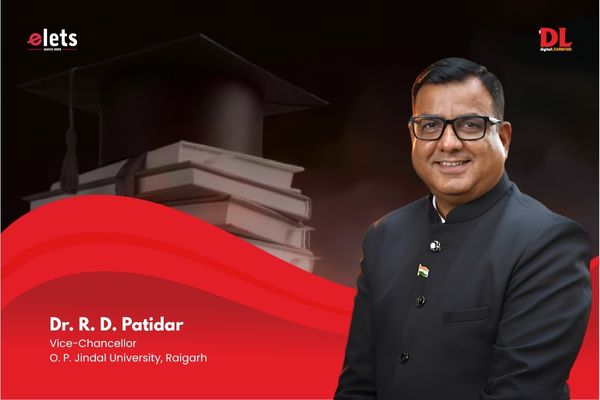
OPJU has proactively embraced the National Education Policy (NEP-2020) by integrating various academic advancements such as research and internationalisation, Institutional Development Plans (IDPs), accreditation quality benchmarks, the Academic Bank of Credits (ABC), and the integration of the Indian Knowledge System (IKS), shared Dr. R. D. Patidar, Vice-Chancellor, O. P. Jindal University, Raigarh in an exclusive interaction with Kaanchi Chawla of Elets News Network (ENN). Edited excerpts:
Your professional journey combines academia and industry. How has your experience at Jindal Steel & Power Ltd. influenced your approach to academia, and what insights have you brought from the industry to OP Jindal University?
My experience in both academia and industry has given me a well-rounded perspective on how to bridge the gap between theoretical knowledge and practical application. One of the key takeaways from my tenure at Jindal Steel & Power Ltd. has been the need for higher educational institutions (HEIs) to integrate project-based learning and long-term industrial internships. At OP Jindal University, we have implemented a semester-long industry internship model for final-year engineering and management students, providing them with real-world exposure. This initiative has significantly enhanced their employability and problem-solving abilities. Our focus on live projects and industry collaborations has resulted in excellent placements for our students in leading multinational companies with competitive compensation packages.
As the Vice Chancellor of OP Jindal University, you’ve implemented an outcome-based framework. How has this approach enhanced the learning experience for students, and what specific outcomes or achievements are you particularly proud of under this framework?
OPJU has proactively embraced the National Education Policy (NEP-2020) by integrating various academic advancements such as research and internationalisation, Institutional Development Plans (IDPs), accreditation quality benchmarks, the Academic Bank of Credits (ABC), and the integration of the Indian Knowledge System (IKS). We have also modified our ordinances as per NEP guidelines to ensure a flexible and multidisciplinary learning environment.
With well-defined Programme Outcomes (POs), Programme Specific Outcomes (PSOs), and Course Outcomes (COs), we offer specialised undergraduate, postgraduate, and research programs. Regular assessments and feedback mechanisms ensure continuous improvement. The systematic mapping of COs, PSOs, POs, and PEOs helps us refine our programs to align with industry needs and academic excellence.
Collaboration with industry is crucial. Could you explain how OPJU forms partnerships with multinational corporations, and can you share examples of collaborations that have benefited both the university and industry partners?
OPJU stands out as a higher education institution deeply rooted in industry-academia collaboration. Education must ultimately prepare students to contribute effectively in professional environments. Keeping this philosophy at the core, OPJU has established partnerships with over 100 reputed institutions and industries worldwide.
These collaborations provide our students with extensive internship opportunities, hands-on training, and direct access to industry experts. Our students regularly engage with the Jindal Group of Companies and other corporate partners, which not only enhances their practical skills but also facilitates employment in reputable organisations.
If you had the authority to modify one policy in the education sector, what would it be? Would you focus on accessibility, quality enhancement, or innovation in teaching methods?
If I had the power to reform one key aspect of our education system, I would advocate for a single-window regulatory system for all higher education institutions. The current framework, with multiple accreditation and regulatory bodies, often creates unnecessary complexity and delays in decisionmaking. Establishing a single umbrella organisation for higher education governance would streamline accreditation, enhance transparency, and improve the overall efficiency of academic institutions. This reform would allow universities to focus more on innovation, research, and quality education rather than procedural formalities.
What are your aspirations and goals for OP Jindal University, and how do you envision the university contributing to the broader educational landscape in the coming years?
OPJU has earned significant accolades in the academic year 2022– 2023, receiving prestigious awards and recognition. Our aim is to further elevate our academic standing by implementing best practices and fostering a culture of excellence.
We have recently submitted our Self-Study Report (SSR) to the National Assessment and Accreditation Council (NAAC) and are confident of achieving a commendable grade. In the coming years, we plan to expand our campus infrastructure, enhance research and innovation ecosystems, and attract global collaborations. I strongly believe that creating a research-driven academic environment will empower both faculty and students to contribute meaningfully to knowledge creation and societal development.
Also Read: Crafting World-Class Institutions for a Global Knowledge Era
Could you tell us a little about your background and what influenced your decision to pursue a career in academia?
My academic journey has been fueled by an innate passion for learning and knowledge dissemination. Engineering and technology have always intrigued me, but I realised early on that my true calling lay in shaping young minds and fostering innovation. This realisation steered me toward academia, where I could bridge the gap between theoretical knowledge and its practical application in industries. My tenure in both industry and academia has reinforced my belief that education should be dynamic, industry-relevant, and forward-thinking.
Who has been the most significant influence in your life, both personally and professionally?
Personally, my family has been my pillar of strength, instilling in me the values of perseverance, discipline, and integrity. Professionally, I have been inspired by visionary leaders in both academia and industry who have redefined education through innovation and excellence. Their ability to transform institutions and drive meaningful change has motivated me to constantly strive for improvement in my own leadership journey.
























